PRINCETON, NJ -- Energy states were among the best job markets in the U.S. in 2009, along with states benefiting from federal jobs. States particularly hurt by the financial and housing crises were among the worst job markets. Every state and the District of Columbia saw job market conditions deteriorate between 2008 and 2009.
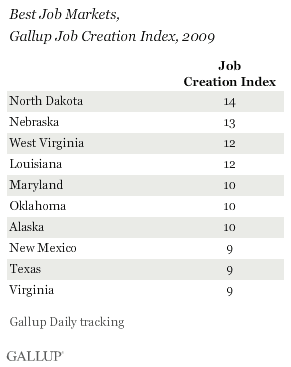
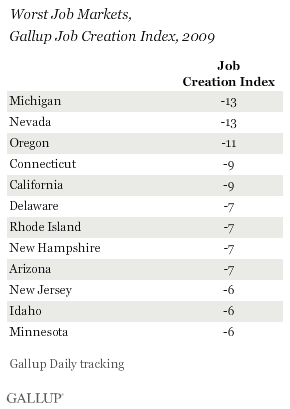
The results for Gallup's Job Creation Index reflect aggregated data from approximately 100,000 Gallup Daily tracking interviews conducted throughout 2009 with employed adults in all 50 states plus the District of Columbia. Gallup asks those who are employed whether their companies are hiring workers and expanding the size of their labor forces, not changing the size of their workforces, or laying off workers and reducing the number of employees they have. The Job Creation Index reports the net difference between the percentage reporting an expansion and the percentage reporting a reduction in their workforces.
Energy-producing states such as North Dakota, Louisiana, West Virginia, Oklahoma, and Texas were home to some of the top job markets in the U.S. in 2009, as they were in 2008. They were joined by Alaska and New Mexico, two other energy states; Nebraska, a farm state benefiting from ethanol and a strong commodities market; and Maryland and Virginia, two states benefiting from the presence of federal government employees.
Despite the recent improvement in manufacturing and banking, economically long-depressed Michigan and financial-crisis states in the Northeast, including Rhode Island, Delaware, New Jersey, and Connecticut continued to be some of the worst state job markets in 2009. The housing-crash states of Nevada and California also remained near the bottom of the list, joined by Arizona, another state with housing problems, and two other Western states -- Oregon and Idaho. New Hampshire, another financial state, was on the list of worst job market states, as was Minnesota.
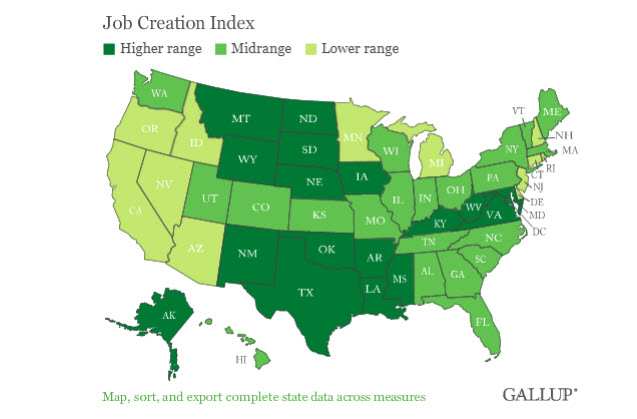
In 2009 nationwide, the figures were 24% hiring and 25% letting go.
Least and Most Job Market Deterioration
Every state and the District of Columbia saw job market conditions deteriorate between 2008 and 2009. Areas benefiting from the presence of federal government employees experienced comparatively stable job market conditions: the District of Columbia, Maryland, and Virginia. Also seeing the least deterioration were some of the best job markets in 2009 -- New Mexico, Nebraska, and Alaska. On the other hand, several states with the worst job markets in 2008 also saw the least change in 2009 -- presumably because they had declined so much already: Vermont, Rhode Island, and Florida. Montana was also among the job markets having the least deterioration between 2008 and 2009.
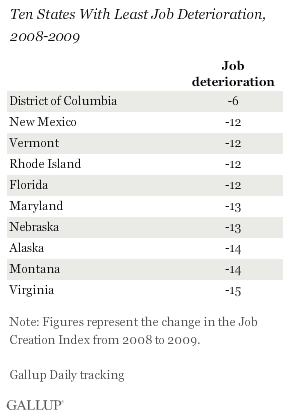
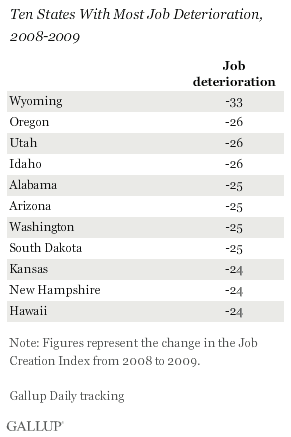
Among those experiencing the most deterioration were three states among the top 10 job markets in 2008: Wyoming, Utah, and South Dakota, probably reflecting the reduction in gas and oil exploration last year. Also included were several states that ended up with the worst job markets of 2009: Oregon, Idaho, Arizona, and New Hampshire. Others seeing big declines included Kansas, Alabama, Washington, and Hawaii.
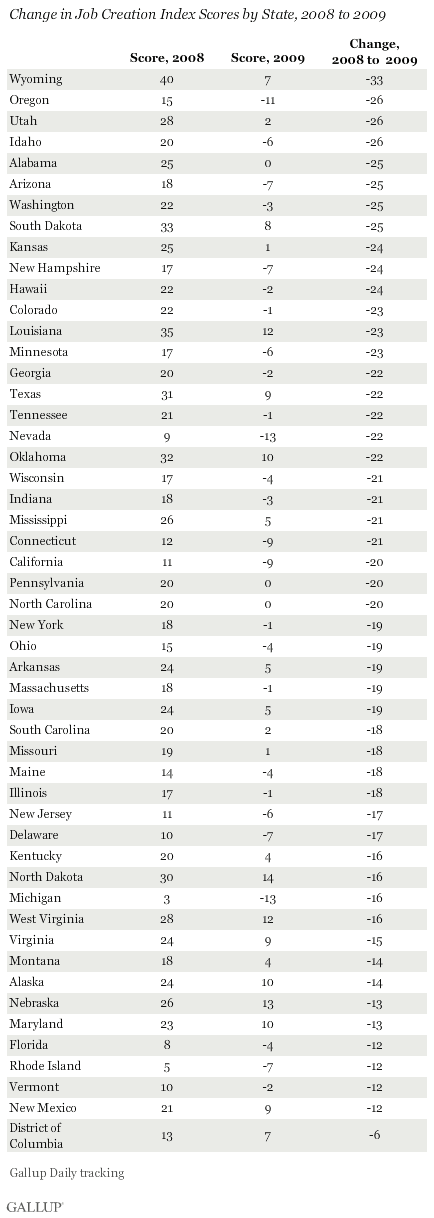
Bottom Line
Many of the circumstances that dominated job market conditions during 2008 continued to do so during 2009: energy and commodity states continued to see their job markets do comparatively well, while job market conditions in housing- and financial-debacle states continued to fare relatively poorly. States with a significant number of federal employees also seem to be among the least affected as job market conditions deteriorated between 2008 and 2009.
Of course, the annual data in these comparisons do not show the sharp deterioration of job market conditions in early 2009 or the comparative recovery later in the year. However, they do suggest that the deepening recession of 2009 had a significantly negative impact on job market conditions across the nation.
In 2010, the factors that influence comparative job market conditions may change. For example, improving conditions in the manufacturing sector could mean comparative improvements in job market conditions in many long-depressed areas. Similarly, continuing improvements in the financial and housing sectors could help the job market in many currently depressed states.
Still, improvements in some states are not enough to get the U.S. economy on a sustainable growth path for 2010-2011. Instead, widespread improvements in job market conditions will need to happen in every state.
Gallup's "State of the States" series reveals state-by-state differences on political, economic, and well-being measures Gallup tracks each day. New stories will be released throughout the month of February.
Survey Methods
Results are based on telephone interviews with 94,018 employed adults, aged 18 and older, conducted Jan. 2-Dec. 30, 2009, as part of Gallup Daily tracking. For results based on the total sample of national adults, one can say with 95% confidence that the maximum margin of sampling error is ±1 percentage point.
The margins of sampling error range from ±1 percentage point for large states such as California to as high as ±9 percentage points for the District of Columbia.
Interviews are conducted with respondents on land-line telephones (for respondents with a land-line telephone) and cellular phones (for respondents who are cell-phone only).
In addition to sampling error, question wording and practical difficulties in conducting surveys can introduce error or bias into the findings of public opinion polls.
